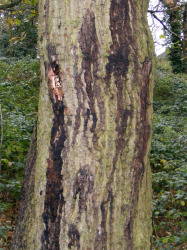Summary
Summary

This project is providing understanding of the current and future health threats to native oaks in the UK. It is focussing on Acute Oak Decline (AOD).
PuRpOsE involves scientists from many different disciplines including molecular biologists, forest ecologists, silviculturists, human geographers and political ecologists. We aim to work together and engage with interest groups to exchange expertise and develop the evidence needed to take effective action to help us to manage AOD and other threats to the health of native oak trees in the UK.
Research objectives
The objectives of the project are to:
Understand the causes of oak decline, particularly AOD;
Develop adaptation management strategies to help oak woodlands better cope with threats and identify future threats to oak;
Assess the impacts of oak decline on biodiversity and ecosystem services and develop management options that help to reduce negative impacts;
Understand the interactions between pests/diseases, hosts, and the wider environment and humans to develop collaborative strategies for managing and living with AOD.
Forest Research is contributing to these objectives through its involvement in a number of the project’s Work Packages (WPs). In particular we are:
- Leading WP2 which is analysing the threats to the health of oak woodlands in the UK and suggesting adaptation strategies which may be used to help oak woodlands better cope with these threats, particularly the changing climate.
- Identifying and validating candidate indictors of the vulnerability of oaks to AOD (WP1)
- Identifying the ecological services provided by oak trees (WP3), in particular using indicators to calculate the regional amounts of ecosystem services provided by oak in relation to water quality, recreation and carbon storage. We are also assessing the cultural services provided by oaks (WP4).
- Developing woodland management options which will help woodland managers to off-set the ecological impact (loss of species and services) of a decline oak woodland (WP3). Case studies will be developed to enable woodland managers to conduct similar assessments for other sites.
Results so far
So far we have:
- Contributed to intensive surveys of oak woodlands at two sites known to have AOD (we aim to survey 3 sites), and conducted similar surveys at 12 further sites showing variable levels of vigour over long time periods.
- Agreed the scope of the Horizon Scanning exercise and designed a questionnaire to gather information on potential oak pests and diseases from international tree health and forestry experts. We have begun to recruit experts.
- Identified potential replacement species suitable in oak high-risk areas in UK
Status
PuRpOsE started in 2016 and will complete in 2019.
Outputs
Research Note Ecological implications of oak decline in Great Britain by Alice Broome, Victoria Stokes, Ruth Mitchell and Duncan Ray was published in 2021. The Note describes the ecological value of Great Britain’s native oaks, as reflected in the biodiversity supported by oaks and ecosystem functions oaks perform. Based on 30 case studies, the Note describes the characteristics of oak woodlands in Great Britain, the consequences of oak decline for oak-associated biodiversity and suggested management actions in preparation for, or in response to, oak decline. Supplementary Table 6s classes the ecological site conditions of the 30 case study sites and presents a list of tree and shrub species which would be suitable to establish at each of the sites. These tree and shrub species could support a large proportion of the ‘Highly’ and “Partially’ oak associated species considered to be present at case study sites.
Contact
Funders and partners
This research is funded by the Living With Environmental Change Partnership under the Tree Health and Plant Biosecurity Initiative.
The project is a partnership between University of Reading, Centre for Ecology & Hydrology, Forest Research, University of Oxford, The James Hutton Institute, Stockholm Environment Institute and University of York.
